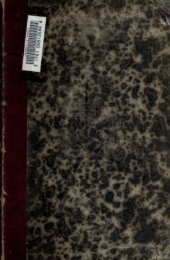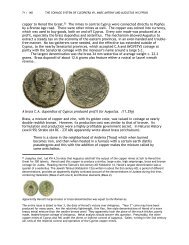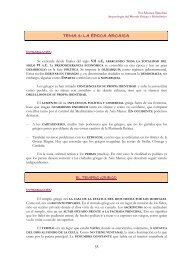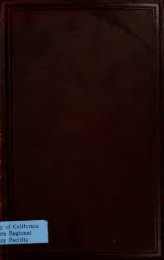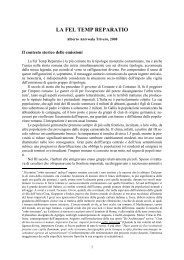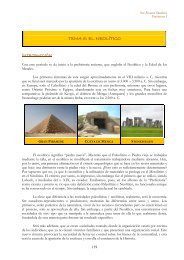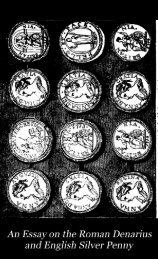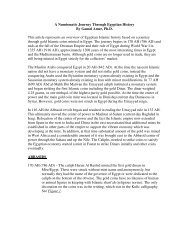Numismata hellenica: a catalogue of Greek coins; with notes, a map ...
Numismata hellenica: a catalogue of Greek coins; with notes, a map ...
Numismata hellenica: a catalogue of Greek coins; with notes, a map ...
Create successful ePaper yourself
Turn your PDF publications into a flip-book with our unique Google optimized e-Paper software.
22]<br />
Damastium (lUyrici) probably a colony <strong>of</strong> Zacyntbus, and<br />
situated at the modern Kroya, Eu. 44.<br />
Damophon, a cnllection <strong>of</strong> statues by this artist in the<br />
temple <strong>of</strong> Asclepius at Messene, his native city, Eu. 74.<br />
Dancle. See Messana.<br />
Daphne, near Antioch, now Beit-el-Ma, temples <strong>of</strong> Diana<br />
converted into<br />
and Apollo there situated j its buildings<br />
a palace by the Emperor Theodosius, As. 12, 13.<br />
Dardania (Moesise Superioris) situated immediately north<br />
<strong>of</strong> Pseonia, Eu. 159.<br />
Dardanus (Troadis) noted for its fighting-cocks ; hence<br />
the figure <strong>of</strong> a cock on its <strong>coins</strong>, As. 52.<br />
Darics, the name <strong>of</strong> these Persian gold <strong>coins</strong> derived from<br />
Dareius, son <strong>of</strong> Hystaspes, their first coiner; an imitation<br />
<strong>of</strong> the Lydian money ; their great circulation an-<br />
ciently in Greece, K. 52.<br />
Datus (Thracia;). See Neopolis Macedoniae.<br />
Deiotarus II., king <strong>of</strong> Galatia, deserts from Antony to<br />
Octavius during the battle <strong>of</strong> Actium, K. 44.<br />
Delium (Boeotiaj) more important in earlier times than<br />
its <strong>coins</strong>, Eu. 44.<br />
when described by Livy ;<br />
INDEX TO THE NOTES.<br />
Delphi, defeat <strong>of</strong> the Gauls there in b.c. 279 attributed to<br />
Pan, K. 13<br />
—^— (Phocidis), the negro's head on some <strong>of</strong> its <strong>coins</strong> intended<br />
for jEsop, who was murdered by its people, Eu. 45.<br />
Delus, the palm-tree on its <strong>coins</strong> allusive to the birth <strong>of</strong><br />
Apollo there, Ins. 16.<br />
Demetrias (Thessaliae) founded by Demetrius Poliorcetes<br />
about 290 B.C.; called one <strong>of</strong> the fetters <strong>of</strong> Greece by<br />
Philip, son <strong>of</strong> Demetrius ; its remains near Volo, Eu. 45.<br />
Demetrius I. (Poliorcetes) <strong>of</strong> Macedonia, the battle <strong>of</strong><br />
Cyprus in b.c 306 referred to by the types <strong>of</strong> his <strong>coins</strong> ;<br />
the regal title assumed by him after that battle ; his<br />
<strong>coins</strong> apparently struck in Macedonia, K. 1 1 : defeated<br />
at Gaza in 312 b.c by Seleucus I. <strong>of</strong> Syria and Ptolemaeus<br />
I. <strong>of</strong> Egypt, K. 21 : the Rhodians saved from him<br />
by the latter, K. 58.<br />
II. <strong>of</strong> Macedonia, reasons for ascribing <strong>coins</strong> to<br />
him, K. 14.<br />
I. (Soter) <strong>of</strong> Syria sent to Rome by his father<br />
as a hostage, K. 26 : entitled Soter for having expelled<br />
the tyrant Heracleides from Babylon ; enmity <strong>of</strong> the<br />
Romans against him ; slain 150 b.c in a battle <strong>with</strong><br />
Alexander Balas and his allies, K. 27.<br />
II. (Nicator) <strong>of</strong> Syria, his reign commenced<br />
in 146 B.C., after his defeat <strong>of</strong> Antiochus VI., K. 30:<br />
married to Cleopatra, daughter <strong>of</strong> Ptolemy VI. <strong>of</strong> Egypt,<br />
K. 33 : defeated and made captive in Parthia, K. 30 :<br />
there marries Rhodogune, the king's daughter, K. 33 :<br />
his throne meanwhile claimed by his brother Sidetes ;<br />
some <strong>of</strong> his <strong>coins</strong> struck at Mallus their ; reverse<br />
probably a statue <strong>of</strong> Astarte in that city, K. 30 :<br />
released by Phrahates <strong>of</strong> Parthia, and returns from<br />
captivity in 129 b.c, K. 31, 32: defeated by Alexander<br />
II. <strong>of</strong> Syria, K. 32 : refused admittance to Acca by<br />
his wife Cleopatra, K. 33 : killed at Tyre, K. 32, 33.<br />
III. (Eucserus, Philopator, Soter) <strong>of</strong> Syria reigns<br />
simultaneously <strong>with</strong> his brother Philip, <strong>with</strong> whom he<br />
subsequently makes war ; carried prisoner into Parthia,<br />
and dies there, K. 37.<br />
<strong>of</strong><br />
-_—<br />
Bactria, his conquests in Ariana and India,<br />
during the reign <strong>of</strong> his father Euthydemus ; supplanted<br />
by Eucratides, K. 55.<br />
Desposna represented by the female head on the <strong>coins</strong> <strong>of</strong><br />
Arcadia, Eu. 16 : the same as Aphrodite, Eu. 38.<br />
Deucetius the founder <strong>of</strong> Calacte Siciliae, on his return<br />
from exile at Corinth, Ins. 52.<br />
Deultum or Develton (Thraciee) a colony established by<br />
Vespasian, Eu. 45.<br />
Dia (Bithyniee) on the sea-coast, sixty stades east <strong>of</strong> the<br />
river Hypius, As. 52.<br />
Diana (Leucophrys), ruins <strong>of</strong> her temple at Magnesia,<br />
now Inekl)azar; resemblance <strong>of</strong> the early figures <strong>of</strong><br />
Diana at Ephesus, Magnesia, and Perga, <strong>with</strong> that <strong>of</strong><br />
Juno at Samus, and that <strong>of</strong> Astarte at Mallus,— all derived<br />
from a Phoenician original. As. 77, 78. 95 : Diana,<br />
temples <strong>of</strong>, at Argos Argolidis, Eu. 19 : at Las Laconic,<br />
Eu. 60 : at Stymphalus Arcadise, Eu. 98 : at Troezen,<br />
Eu. 165 : and at Salamis, Ins. 36.<br />
Didrachmon, Attic, observations upon the cause <strong>of</strong> there<br />
being a weight equiponderant <strong>of</strong> it in use in Persia,<br />
Lydia, and the <strong>Greek</strong> cities <strong>of</strong> Europe and Asia, the<br />
./Eolic and Doric cities excepted, 1] — 4].<br />
Diocaesarea. See Sepphoris Galileae.<br />
Diodotus <strong>of</strong> Apameia (Tryphon) sets up Antiochus VI.,<br />
and afterwards murders him ; slain by Antiochus<br />
Sidetes, K. 30 : Jonathan Maccabseus put to death by<br />
him, K. 40.<br />
Diodotus assumes the title <strong>of</strong> king <strong>of</strong> Bactria in 255 b.c,<br />
K.54.<br />
II. <strong>of</strong> Bactria expelled by Euthydemus, K. 54.<br />
Dionysius, tyrant <strong>of</strong> Heracleia Bithyniae, As. 65.<br />
, tyrant <strong>of</strong> Tripolis Phoeniciae, beheaded by<br />
Pompey, As. 137.<br />
I. <strong>of</strong> Syracuse founds and peoples Tyndaris from<br />
Messana in 396 b.c, Ins. 63. 78 : Motya besieged and<br />
destroyed by him in 397 B.C., Ins. 65.<br />
II. the destroyer <strong>of</strong> Naxus in Sicily, Ins. 65.<br />
called Cruni<br />
and Matiopolis ;<br />
Eu. 45.<br />
its position at the modern Kavarna,<br />
Dionysopolis (Moesise Inferioris) previously<br />
(Phrygise) on the Upper Maeander, not far<br />
westward <strong>of</strong> Apameia Cibotus ;<br />
As. 52.<br />
mentioned by Cicero,<br />
Dionysus, epithet <strong>of</strong> Antiochus VI. <strong>of</strong> Svria, K. 29: <strong>of</strong><br />
Antiochus XII., K. 37: <strong>of</strong> Antiochus' XIII., K. 3R :<br />
and <strong>of</strong> Ptolemy XII. <strong>of</strong> Egypt, K. 62.<br />
Dioscurias (Colchidis), now Iskuria, a Milesian colony ;<br />
afterwards called Sebastopolis, As. 52.<br />
Dioshieron (Ionise) between Lebedus and Colophon ; part<br />
<strong>of</strong> its territory on the Caystrus, whence the personification<br />
<strong>of</strong> that river on its <strong>coins</strong>. As. 52.<br />
Dium CMacedoniae) colonized by Julius Caesar and Augustus;<br />
its remains at Malathria, Eu. 46.<br />
Docimium (Phrygiae) named after Docimus, one <strong>of</strong> the<br />
generals<br />
<strong>of</strong> Alexander the Great : the marble from its<br />
quarries famous at Rome, and more commonly called<br />
Synnadic marble. As. 52. 124.<br />
Dodona, its position near loannina ; the <strong>coins</strong> <strong>of</strong> Epirna<br />
in genere there struck ; no other kind <strong>of</strong> its money<br />
known, Eu. 51.<br />
Doganlu, position <strong>of</strong> the valley now so called, twelve miles<br />
from Nacoleia Phrygiae ; the place <strong>of</strong> sepulture<br />
<strong>of</strong> some<br />
<strong>of</strong> the Phrygian kings ; the inscriptions upon the monuments<br />
there the only known documents in the Phrygian<br />
language. As. 86.<br />
Doliehe (Commagenes) near Zeugma on the Euphrates,<br />
As. 53.<br />
Doric architecture, its origin ; mistake that it was derived<br />
from Egypt, Eu. 161.<br />
Dorylaeum, its position at Eski-Sheher verified by that <strong>of</strong><br />
Nacoleia Phrygiae at Seid-el-Ghazi, As. 86.<br />
Dracanum, the chief city <strong>of</strong> Icaria, the<br />
EKKAPPEl there struck, Ins. 21, 22.<br />
<strong>coins</strong> inscribed<br />
Drachma, Attic. See Solon.<br />
Drepanum, now Trapani, anciently the harbour <strong>of</strong> Eryx<br />
Siciliae, Ins. 56.<br />
Dusares, Bacchus so called by some <strong>of</strong> the Arabians, As. 35.



